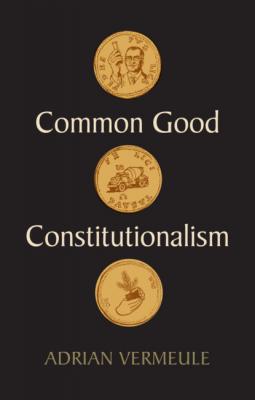Common Good Constitutionalism. Adrian Vermeule
Чтение книги онлайн.
Читать онлайн книгу Common Good Constitutionalism - Adrian Vermeule страница 4
 style="font-size:15px;"> 149
142
style="font-size:15px;"> 149
142
150 143
151 144
152 145
153 146
154 147
155 148
156 149
157 150
158 151
159 152
160 153
161 154
162 155
163 156
164 157
165 158
166 159
167 160
168 161
169 162
170 163
171 164
172 165
173 166
174 167
175 168
176 169
177 170
178 171
179 172
180 173
181 174
182 175
183 176
184 177
185 178
186 179
187 180
188 181
189 182
190 183
191 184
192 230
193 231
194 232
195 233
196 234
197 235
198 236
199 237
200 238
201 239
202 240
203 241
204 242
“Elegant, insightful, magisterial: Adrian Vermeule has written an instant classic of scholarship, exposing the poverty of today’s prevailing legal theories, left and right, and pointing us to a better alternative – one as vibrant and radical as the Western tradition.”
Sohrab Ahmari, author of The Unbroken Thread and From Fire, by Water
“You are holding that rarest of books, one that will change minds, change the terms of debate, and change the future. Adrian Vermeule has written the most important and original book on constitutional theory for this generation. Future scholars, lawyers, and citizens will look back at this book for having sounded the death knell of the seemingly unassailable camps of conservative ‘originalism’ and progressive ‘living constitutionalism,’ revealing them to be exhausted sides of the same devalued liberal coin. More importantly, this book charts a new and better path – a common good constitutionalism grounded in the classical tradition but repurposed for the revitalization of a declining but redeemable republic.”
Patrick J. Deneen, University of Notre Dame, author of Why Liberalism Failed
“This is the most important book of American constitutional theory in many decades. Adrian Vermeule unearths the entirely forgotten classical legal tradition – a mix of Roman law, canon law, and civil law – which dominated judicial thinking from the founding until positivism began to consume constitutional law in the early twentieth century. He exposes the dominant originalist paradigm as an impoverished Johnny-come-lately to the constitutional scene. And he powerfully demonstrates how the classical legal tradition’s central idea – promotion of the common good – can inform contemporary public law thinking to promote community flourishing, both domestically and globally. Common Good Constitutionalism is a bolt from the blue that challenges conservative and progressive constitutional law paradigms alike. It is destined to infuriate, and to reorient.”
Jack Goldsmith, Learned Hand Professor of Law, Harvard University
“This bold and provocative book challenges the views on constitutional interpretation of both US conservatives and liberals, and reframes the debate by focusing on a substantive concept: the common good. With his characteristic originality and ability to weave the insights of different disciplines, Vermeule puts forward a thought-provoking account of the common good and its legal implications, one which will be of relevance well beyond American debates. Even those who disagree with it will have much to learn from this erudite engagement with one of the main concepts in political thought.”
Francisco J. Urbina, Pontificia Universidad Católica de Chile
[I]t is impossible that there can be a right which does not aim at the common good. Hence Cicero is correct when he says in the De inventione that laws are always to be interpreted for the benefit of the community. For if laws are not framed for the benefit of those who are subject to the law, they are laws in name only, but in reality they cannot be laws; for laws must bind men together for their mutual benefit. Dante Alighieri, De Monarchia (Prue Shaw, trans. and ed.)
The praetor is also said to render legal right (jus) even when he makes a wrongful decree, the reference, of course, being in this case not to what the praetor has done, but to what it is right for a praetor to do.